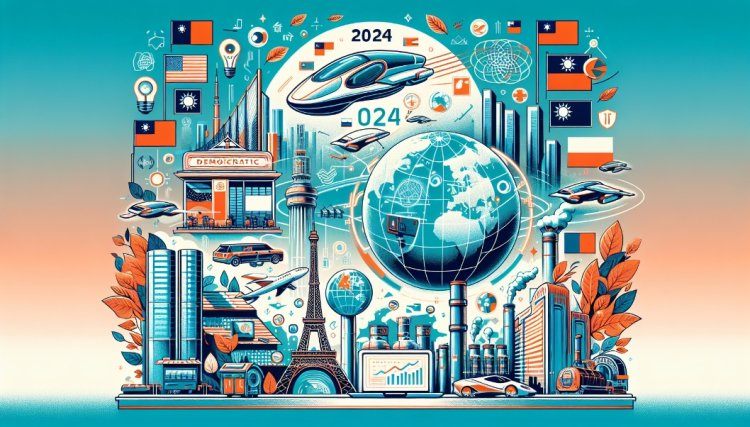The World Ahead 2024: Elections, Flying Taxis, AI Regulation, Green Industry, and Shifting Power Dynamics
Buckle up for a wild ride in 2024! From ballot box battles to sky taxis soaring, AI ethics debates to green revolutions, and shifting power dynamics, the world is about to take a thrilling turn. Get ready to navigate the twists and turns with our guide to the year ahead!

Introduction: The World Ahead in 2024
In 2024, the world is poised to experience significant events and trends that will shape the global landscape. This year will see the largest display of democracy in history, with more than half of the world's population living in countries holding national elections. However, two elections stand out for their potential global repercussions.
The first is the election in Taiwan, a small self-governing island less than 200 kilometres off the coast of China. Taiwan is a geopolitical flashpoint, with the potential for an invasion by China, which could lead to war with America. The outcome of Taiwan's election will play a crucial role in determining the strategy to deter or hasten a Chinese invasion.
Meanwhile, the US election will also have a significant impact on global relations. The choices made by the winning candidate could shape the US's response to potential conflicts and alliances around the world. President Biden has already expressed a willingness to send the US military into Taiwan if President Xi were to invade.
Beyond politics, the 2024 Paris Olympics will capture the world's attention. This event will not only showcase athletic prowess but also mark a milestone in the future of public transport. Electric vertical take-off and landing (eVTOL) aircraft, also known as flying taxis, will be introduced for commercial service. These sustainable vehicles run on batteries and have the potential to revolutionise urban mobility.
However, the rapid development of eVTOLs poses challenges for aviation regulators in terms of safety and certification. Companies like Volocopter, which runs the eVTOL flights in Paris, have had to navigate these regulatory hurdles. Additionally, private eVTOLs will also enter the market, providing recreational flying experiences for those with deep enough pockets.
In the realm of technology, AI regulation and control will be a key focus in 2024. The discussion has shifted from theoretical risks to the immediate concerns of bias and discrimination in AI systems. Many governments lack transparency in their deployment of AI, raising questions about fairness and accountability. Efforts are being made to address these risks through AI safety summits and regulatory frameworks.
Decarbonising heavy industry will also take centre stage in 2024. While the focus has mainly been on cleaning up the energy and transportation sectors, the impact of industrial greenhouse gas emissions cannot be ignored. Innovations in the green industry, such as Coolbrook's rotodynamic heater, offer sustainable alternatives to fossil fuel-dependent processes.
As the BRICS (Brazil, Russia, India, China, and South Africa) expand to include Egypt, Ethiopia, Iran, Saudi Arabia, and the United Arab Emirates, the world order faces new challenges. These diverse economies, with differing priorities and strained relations with the West, are challenging the American-led financial system. The rise of middle powers indicates a more multipolar world where negotiation and influence are shared among various nations.
In conclusion, the world ahead in 2024 promises to be a dynamic and transformative period. From elections shaping geopolitical tensions to advancements in transportation, technology, and sustainability, global dynamics are evolving. As the power dynamics shift and new challenges emerge, it is essential to stay informed and adapt to the changing world.
Taiwan's Uncertain Future: The High-Stakes Election
The upcoming election in Taiwan holds immense significance in the current tense geopolitical climate. Taiwan, a small, self-governing island located just off the coast of China, is a major flashpoint in the region. US intelligence reports indicate that China is preparing for a potential invasion of Taiwan by 2027, which could escalate into a war with the United States. As such, the outcome of Taiwan's election will play a crucial role in determining the strategy to deter or hasten a Chinese invasion.
The threat and fear of invasion loom large among Taiwanese citizens. More than half of the population lacks confidence in their government's ability to defend against a Chinese attack. Some citizens are even attending civil-defence workshops to prepare for the possibility of war. The choice between self-rule and warmer relations with China will be at the forefront of voters' minds in the upcoming election.
Not only does Taiwan's election have implications for the region, but it also intersects with the US election. The strategy pursued by the winning candidate in the US could impact the US's response to potential conflicts and alliances worldwide. President Biden has already expressed a willingness to send the US military to Taiwan if China were to invade. On the other hand, a second Trump presidency could introduce unpredictability and heightened risk.
The potential consequences of a Chinese invasion of Taiwan are significant, not only for Taiwan but for the world at large. It could fundamentally alter the balance of power in the Asia-Pacific region and have far-reaching implications for international relations. The outcome of Taiwan's election, therefore, holds immense importance for global stability and security.
In the midst of these high-stakes elections, the 2024 Paris Olympics will capture the world's attention. The event will also mark a milestone in the future of transportation with the introduction of electric vertical take-off and landing (eVTOL) aircraft, also known as flying taxis. These sustainable vehicles, powered by batteries, have the potential to revolutionise urban mobility and offer a new form of transportation.
However, the rapid development of eVTOLs presents challenges in terms of safety and certification. Aviation regulators are grappling with how to regulate and ensure the safety of these new aircraft. Companies like Volocopter, which runs the eVTOL flights in Paris, have had to navigate these regulatory hurdles to bring their technology to market.
In conclusion, the upcoming election in Taiwan holds immense weight in the current geopolitical climate. The choice between self-rule and warmer relations with China, as well as the potential impact of deterring or hastening a Chinese invasion, will shape the future of Taiwan and have far-reaching consequences for the world. As the world watches the outcome of Taiwan's election, the interplay with the US election and the implications for global stability cannot be understated.
Flying Taxis: The Future of Public Transport
Introduction to eVTOLs and their potential as flying taxis
eVTOLs, which stand for Electric Vertical Take-Off and Landing aircraft, are the future of public transport. These sustainable vehicles run entirely on batteries, making them a greener alternative to traditional transportation methods. With their ability to take off and land like helicopters, eVTOLs have the potential to revolutionise urban mobility and offer a new form of transportation.
The advancements and public test flights of eVTOLs
Over the past few years, there have been significant advancements in eVTOL technology. Public test flights have become more frequent, showcasing the capabilities and safety of these aircraft. As the technology continues to improve, eVTOLs are becoming more reliable and efficient, bringing us closer to the era of commercial eVTOL flights.
The anticipated commercial service milestone at the 2024 Paris Olympics
The 2024 Paris Olympics will be a significant milestone for eVTOLs, as it marks the introduction of commercial service. If all goes according to plan, the Paris Olympics will see the launch of commercial eVTOL flights, transporting tourists along various routes at speeds of up to 110 kph. This will be a major step forward in integrating eVTOLs into our daily lives.
Volocopter's plans and routes for commercial eVTOL flights
Volocopter, a leading company in the eVTOL industry, has already made plans for commercial flights. They are set to operate eVTOL flights in Paris during the 2024 Olympics, offering tourists a unique and sustainable way to explore the city. Volocopter has identified five different routes for their commercial eVTOL flights, providing convenient transportation options for residents and visitors alike.
The sustainability and benefits of eVTOLs for urban mobility
eVTOLs offer several sustainability benefits for urban mobility. By running on batteries, they produce zero emissions, reducing air and noise pollution in cities. Additionally, eVTOLs have the potential to alleviate traffic congestion, as they can bypass roads and fly directly to their destinations. This efficiency and convenience make eVTOLs an attractive option for urban commuters and travellers.
The challenges of certifying and regulating eVTOL flights
One of the main challenges to the widespread adoption of eVTOLs is certifying and regulating their flights. Aviation regulators are working to establish safety standards and certification processes for eVTOL aircraft. Companies like Volocopter have had to navigate these regulatory hurdles to ensure the safety and reliability of their eVTOLs.
Other companies entering the eVTOL market
Volocopter is not the only company entering the e-VTOL market. Across the world, numerous companies are racing to develop their own eVTOL aircraft. This competition is driving innovation and pushing the boundaries of e-VTOL technology. With a market projected to be worth $1 trillion by 2040, the eVTOL industry is attracting significant investment and attention.
The emergence of private eVTOLs for personal use
In addition to commercial eVTOL flights, there is also a growing market for private eVTOLs for personal use. Companies like Pivotal are developing eVTOLs that can be purchased and piloted by individuals. These personal flying vehicles offer a unique and exhilarating way to travel, providing a new form of recreational flying.
The experience and training required for piloting private eVTOLs
Piloting private eVTOLs requires a certain level of training and experience. While companies like Pivotal provide a few weeks of training, individuals do not need a pilot's licence to fly these aircraft. However, there are restrictions on where and when these private eVTOLs can be flown. Currently, they are limited to rural areas, daylight hours, and certain flight altitudes.
The future potential and growth of eVTOLs as a new form of transportation
The future of eVTOLs looks promising, with the potential for significant growth as a new form of transportation. As technology continues to advance and regulatory frameworks are established, eVTOLs are expected to become more accessible and integrated into our daily lives. They have the potential to transform how we commute, travel, and explore our cities, offering a faster, greener, and more efficient mode of transportation.
AI Regulation and Control: Balancing Risks and Benefits
The rapid advancement of artificial intelligence (AI) technology has raised concerns about the need for effective regulation and control. While the focus has often been on the potential risks of frontier models, there is a growing recognition of the immediate dangers associated with AI, such as bias and discrimination.
One of the key challenges in regulating AI is the lack of transparency in government usage. Many governments deploy AI systems in decision-making processes without providing clear explanations or accountability. For example, the British government's use of machine learning in welfare investigations raised concerns about potential discrimination in benefit suspensions.
Lessons can be learned from AI scandals in other countries, such as the Netherlands and Australia. In the Netherlands, a tax service wrongfully accused thousands of families of fraud, causing significant distress and leading to the downfall of the government. Similarly, Australia's "robodebt" scandal resulted in suicides due to automated debt collection and accusations of welfare fraud.
To address these risks, efforts are being made to introduce regulatory frameworks. The European Union is expected to implement the AI Act in 2024, aiming to establish guidelines for the ethical and responsible use of AI. Additionally, AI safety summits have been organised to discuss the risks and develop strategies to mitigate them.
However, there are debates within the AI community regarding the focus on existential risks versus existing harms. Some argue that emphasising speculative future dangers distracts from addressing the real and immediate consequences of AI systems. There are also critiques of the hype around AI's potential dangers, suggesting that responsible development and public awareness are more important.
Ultimately, a balance needs to be struck between the risks and benefits of AI. Regulation and control should not stifle technological advancements but should ensure fairness, accountability, and transparency. Responsible AI development is crucial, along with public awareness of the potential risks and the need for ongoing monitoring and evaluation.
Green Industry: Decarbonising for a Sustainable Future
The focus on decarbonising heavy industry is gaining momentum in 2024 as the impact of industrial greenhouse gas emissions becomes increasingly apparent. While efforts have primarily centred around cleaning up the energy and transportation sectors, the significant emissions from industry cannot be ignored.
Industrial processes, particularly those requiring high temperatures, have traditionally relied on fossil fuels like coal and natural gas. This poses a challenge for decarbonisation efforts, as finding sustainable alternatives for these processes is essential.
Innovative solutions are emerging in the form of green industry technologies. One such example is Coolbrook's rotodynamic heater, which generates high temperatures using electricity. By utilising renewable electricity, Coolbrook's technology offers a sustainable alternative to fossil fuel-dependent industrial processes.
Renewable electricity plays a crucial role in powering sustainable industries. As the world transitions towards renewable energy sources, the potential for utilising this clean energy in industrial processes becomes more feasible. By replacing fossil fuel dependency with renewable electricity, industry can significantly reduce its greenhouse gas emissions.
Regulation also plays a vital role in driving decarbonisation efforts in heavy industry. The introduction of carbon taxes and other regulatory frameworks incentivizes companies to adopt cleaner technologies and practices. In 2024, we can expect to see more countries implementing carbon taxes and regulations to encourage the decarbonisation of industry.
Other technologies and approaches are also being explored to decarbonise heavy industry. Startups are developing innovative solutions, such as storing renewable energy in heat-retaining materials or "rocks in a box." These technologies allow for the release of stored heat when needed, providing sustainable energy for industrial processes.
However, decarbonising heavy industry is not without its complexities and obstacles. Industrial processes are often highly intricate and involve significant investment in new capital equipment. Implementing decarbonisation measures requires careful planning and consideration to ensure a smooth transition without disrupting production.
Transitioning heavy industry towards sustainability will require industry-wide collaboration and investment. Governments, businesses, and research institutions need to work together to develop and implement solutions that can drive decarbonisation efforts. This collaborative approach will ensure a more sustainable future for the industry and contribute to global efforts to mitigate climate change.
Shifting Power Dynamics: The BRICS+ Challenge
The BRICS (Brazil, Russia, India, China, and South Africa) have been a significant force in the global economy, representing some of the largest and fastest-growing emerging markets. In 2024, the BRICS alliance is set to expand to include five new members: Egypt, Ethiopia, Iran, Saudi Arabia, and the United Arab Emirates, forming the BRICS+ alliance.
While the addition of these countries strengthens the economic power of the alliance, the BRICS+ members have diverse economic profiles and differing priorities. Brazil, India, and South Africa are primarily focused on developing their domestic markets and reducing income inequality. Russia and Saudi Arabia are heavily reliant on natural resources, while China and the United Arab Emirates are major global players in trade and investment.
The expansion of the BRICS+ alliance poses potential conflicts and challenges. The diverse economic profiles and differing priorities among the members may lead to disagreements on issues such as trade policies, investment strategies, and resource allocation. Additionally, strained relations between some members, such as China and India, could further complicate the alliance's dynamics.
One of the key implications of the BRICS+ expansion is its challenge to the American-led world order. The BRICS+ members, with their large populations and significant economic influence, are seeking to challenge the dominance of the United States and the Western-led financial system. They have established alternative financial systems, such as the New Development Bank, to counter the influence of institutions like the World Bank and the International Monetary Fund.
Furthermore, the BRICS+ alliance has implemented currency swap lines, allowing member countries to trade in their local currencies, reducing their reliance on the US dollar as the global reserve currency. This move aims to create a more multipolar global financial system and reduce the power of the US in global trade and finance.
In this changing global landscape, middle powers play a crucial role in global negotiations and conflicts. Middle powers, such as Egypt and Iran, have the opportunity to exert their influence and shape the agenda on various international issues. They can bridge the gap between major powers and smaller nations, facilitating dialogue and cooperation.
The BRICS+ expansion highlights the shifting dynamics of global power in a more multipolar world. As traditional power structures are challenged, countries outside the Western sphere of influence are rising in economic and political significance. The BRICS+ alliance and its alternative financial systems demonstrate the desire for a more balanced and inclusive world order.
In conclusion, the BRICS+ expansion presents both opportunities and challenges. The diverse economic profiles and differences among the members may lead to conflicts and disagreements. However, the expansion also signifies a shift in global power dynamics and a challenge to the American-led world order. As middle powers gain influence and alternative financial systems emerge, the world is moving towards a more multipolar structure where negotiation and cooperation are shared among various nations.
FAQ
What are the key events and trends in 2024?
In 2024, the world will experience significant events and trends that will shape the global landscape. The year will see the largest display of democracy in history, with more than half of the world's population living in countries holding national elections. This will have far-reaching implications for global politics and power dynamics.
Why is Taiwan's election significant?
Taiwan's election in 2024 holds immense significance in the current tense geopolitical climate. Taiwan is a small, self-governing island located just off the coast of China. The threat of a Chinese invasion looms large, and the outcome of Taiwan's election will play a crucial role in determining the strategy to deter or hasten a Chinese invasion. This election will have implications for the region and the world at large.
What is the future of flying taxis?
Flying taxis, known as eVTOLs (Electric Vertical Take-Off and Landing aircraft), are the future of public transport. These sustainable vehicles run entirely on batteries, making them a greener alternative to traditional transportation methods. The 2024 Paris Olympics will mark a significant milestone in the future of flying taxis, as commercial eVTOL flights are set to be introduced. This technology has the potential to revolutionise urban mobility and offer a new form of transportation.
What are the risks and benefits of AI regulation?
The rapid development of artificial intelligence (AI) technology has raised concerns about the need for effective regulation and control. While AI has the potential for significant benefits, such as improving efficiency and productivity, there are also risks associated with its use. These risks include bias and discrimination in AI systems. Efforts are being made to address these risks through AI safety summits and the introduction of regulatory frameworks.
How can industry decarbonise for a sustainable future?
The focus on decarbonising heavy industry is gaining momentum in 2024. Industrial processes are a significant source of greenhouse gas emissions, and finding sustainable alternatives is crucial. Innovations in green industry technologies, such as Coolbrook's rotodynamic heater, offer sustainable alternatives to fossil fuel-dependent processes. Additionally, regulation plays a vital role in driving decarbonisation efforts in heavy industry, with the introduction of carbon taxes and other regulatory frameworks incentivizing companies to adopt cleaner technologies and practices.
What challenges does BRICS+ face?
The expansion of the BRICS (Brazil, Russia, India, China, and South Africa) to include Egypt, Ethiopia, Iran, Saudi Arabia, and the United Arab Emirates poses new challenges. The diverse economic profiles and differing priorities among the BRICS+ members may lead to disagreements on issues such as trade policies and resource allocation. Additionally, strained relations between some members, such as China and India, could further complicate the alliance's dynamics.
How is the global power dynamic changing?
In 2024, the global power dynamic will shift towards a more multipolar world. The rise of middle powers, such as Egypt and Iran, challenges the American-led world order. These middle powers have the opportunity to exert influence and shape the agenda on various international issues, bridging the gap between major powers and smaller nations. Alternative financial systems, established by the BRICS+ alliance, aim to counter the influence of Western-led institutions and create a more balanced and inclusive world order.
Where can I read more about the world ahead in 2024?
To read more about the world ahead in 2024 and get a head start on the trends and themes to watch, you can take out a subscription to The Economist. The Economist provides comprehensive coverage of global events and analysis of the prospects for the coming year, including The World Ahead 2024.



 admin
admin 










